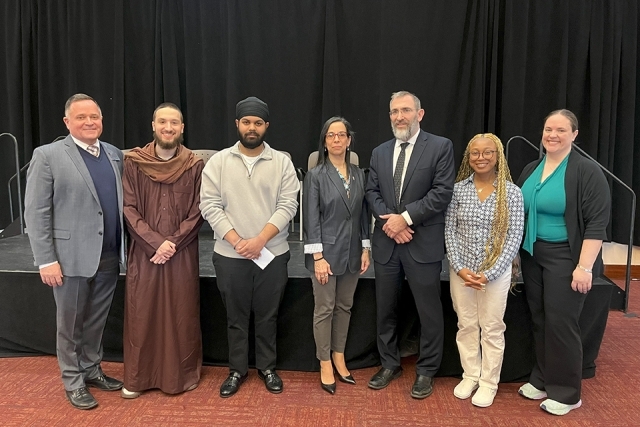
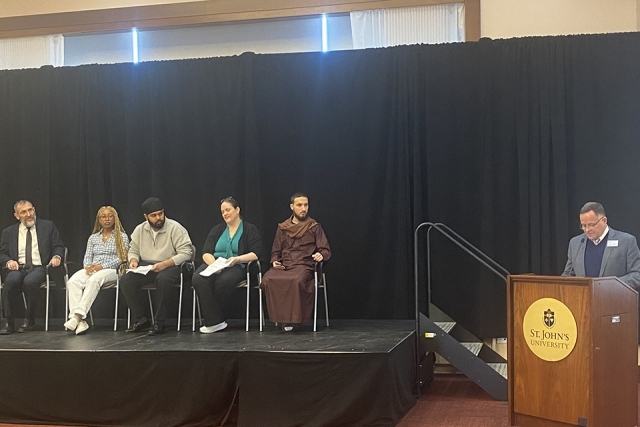
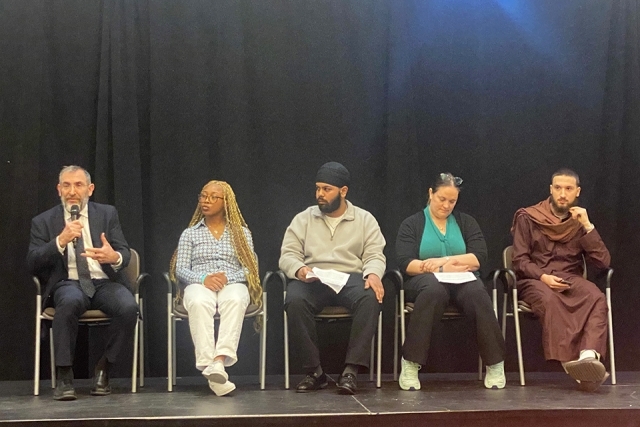
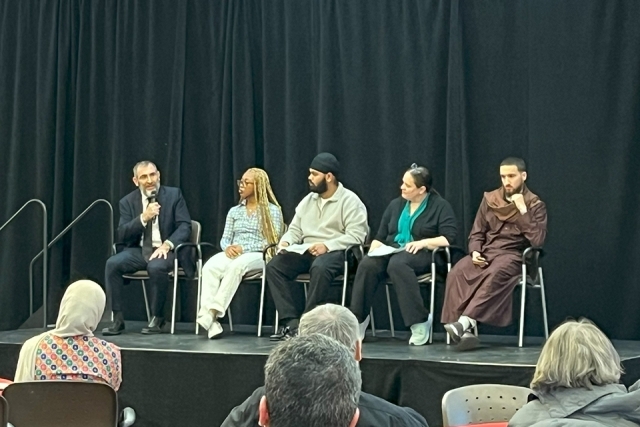
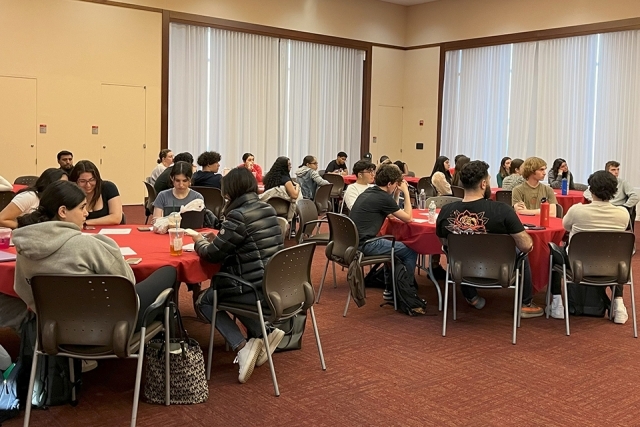
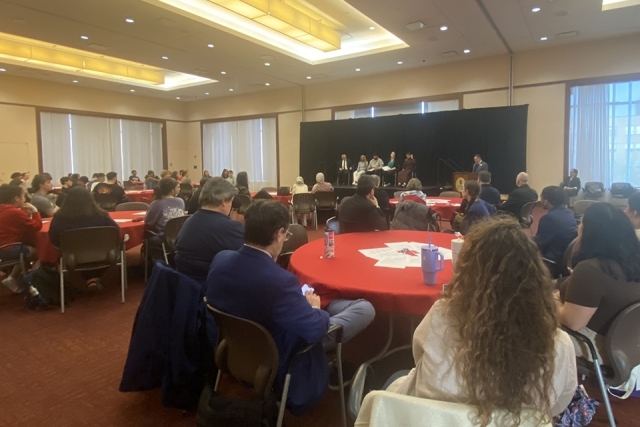
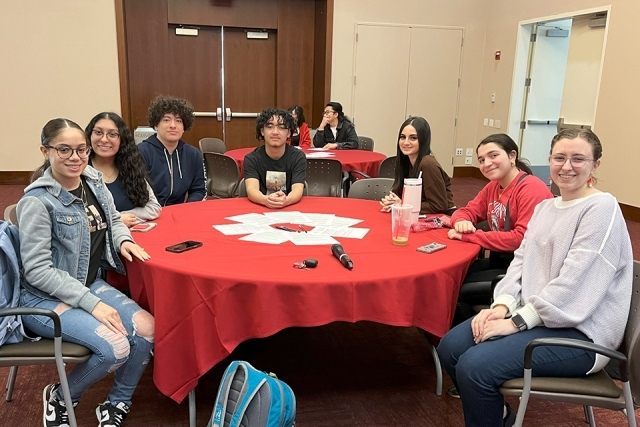
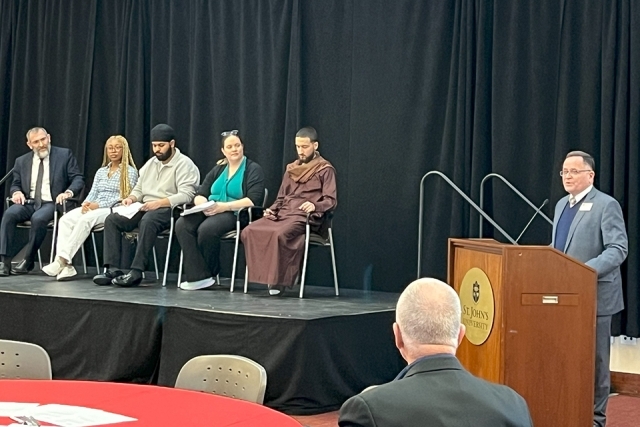
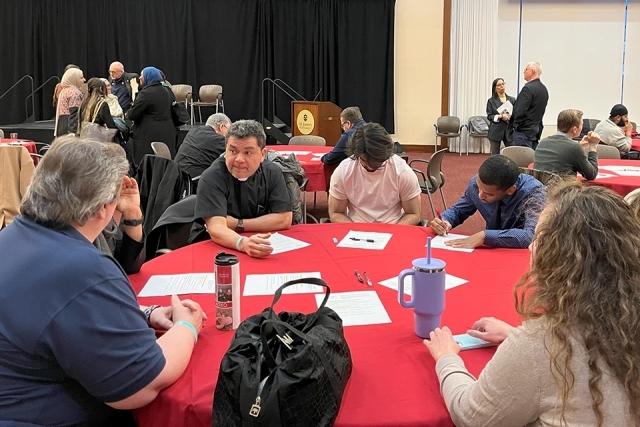
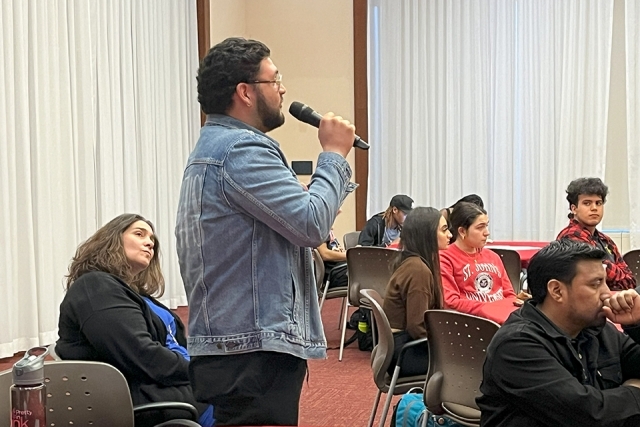
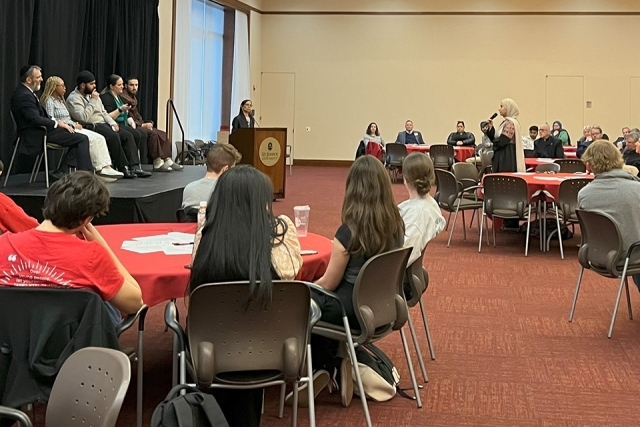











The convergence of the Christian season of Lent and the Muslim holy month of Ramadan, coupled with the coming Jewish celebration of Passover, was the ideal inspiration for discussing interfaith values at St. John’s University.
On March 14, members of five faiths represented on the Queens, NY, campus gathered for a panel discussion, searching for common ground in answer to the question, “What Does It Mean to Be Human?”
Moderator Teresa Delgado, Ph.D., Dean, St. John’s College of Liberal Arts and Sciences, and Professor, Department of Theology and Religious Studies, introduced the question, which panelists attempted to answer through Jewish, Roman Catholic, Muslim, Sikh, and evangelical Christian lenses. The discussion was the foundation of the seventh annual Interfaith Dialogue and Dinner at the D’Angelo Center Ballroom, sponsored by the University’s Interfaith Ministry and Division of Student Success.
Panelists agreed that for all that divides different faiths, respect for the integrity of the human person unites them.
“Human beings are created in the image of God,” said Mordechai Kraft, Adjunct Professor of Jewish Theology and Biblical Hebrew at St. John’s, and Rabbi of Congregation Havurat Yisrael in Forest Hills, NY. “So we have an obligation to resemble God’s way in how we interact with others. We can resemble God’s personality traits—he is compassionate and kind; she is a giver.”
“In a Catholic sense, every one of us, regardless of our faith tradition, is fully and equally loved by God,” added Meghan J. Clark, Ph.D., Associate Professor and Assistant Chair, Department of Theology and Religious Studies. “We are loved into existence. When you accept that we are all equally loved, then you must love others. Everyone is our neighbor.”
Panelists included two current St. John’s students—junior Janae Antrum and first-year student Mohammed Salahaldin—and recent graduate Prabhdheer Singh ’23C, who all come from different faiths.
Janae, a Journalism student from New Haven, CT, and the daughter of a Christian pastor, suggested that a key to understanding our shared humanity is recognizing that, while created in God’s likeness, humans are flawed. Her Christian faith teaches her that salvation springs from the example of Jesus, who loved all.
“We are not perfect,” said Janae, who is Vice President of Sinai’s Radiant Liturgical Dance Ministry at St. John’s. “But Jesus taught us that the greatest commandment is to love, and each of us are striving every day to love ourselves and to love others. That is what is common to our humanity.”
Mohammed, who is Muslim, told the story of a close friend whose brother recently died at a young age. So faithful was his friend’s family that, rather than mourn, they acknowledged his brother’s transition to the afterlife. Such faith should serve to unite all religious people, Mohammed said.
“I found it astonishing that they weren’t crying,” recalled Mohammed, a Pharmacy student who does outreach on behalf of the Muslim Students Association. “But later I realized, as they had, that we should be doing everything for the hereafter. We must prioritize that over anything materialistic. Whatever faith you follow, we are here to help each other.”
Sikhism, according to Mr. Singh, requires the faithful to consider the justice and prosperity of all people. Sikhs honor God in their respect for others and of the planet.
“Sikhism is about behavior as much as it is about believing,” Mr. Singh said, “Be the person who sets the example for everyone else. If someone, regardless of their faith, is being persecuted, do not just be a bystander. Take the first step and do something about it.”
The Interfaith Ministry is an arm of Campus Ministry. Its mission is to create a respectful, cooperative University environment, where people of all religious backgrounds can speak about and practice their faiths.
In attendance for the Interfaith Dialogue and Dinner were members of the Ozanam and Catholic Scholars programs, the Muslim Students Association, the Jewish Students Association, the Sikh student organization AVAAZ, the St. Vincent De Paul Society, Sinai Radiant Praise Dance Ministry, Intervarsity Christian Fellowship, and the Coptic Society.
"This year's alignment of Ramadan, Passover, and Lent is a remarkable opportunity for interfaith dialogue,” said Julia Abayev, treasurer of the Jewish Student Association. “It allows us to learn from one another, sharing our traditions and understanding the means behind our respective observances.”
“Engaging in interfaith dialogue reveals our shared humanity despite theological differences,” added Basmalla A. Hussein, President of the Muslim Students Association. “It fosters mutual respect and understanding among diverse faiths. As Muslims, representation in these dialogues allows us to articulate the profound significance of Islam, and the guiding principles that shape our lives.”
The audience questioned the panelists on the role of faith in a world beset by religiously based conflict. The panelists said recognizing the power of human possibility is the key to meeting the world’s challenges.
“We can make a difference, and that is the message to communicate tonight,” Rabbi Kraft said. “We can take time to help the people we meet in our daily lives. We must realize how powerful we are.”
“We see how strong we are as people of faith by the tests we endure,” Mohammed added. “In Palestine, amid all that has broken down there, people are still praying. And that is the same in Egypt, Yemen, and across the world. We have to be inspired by that.”
Related News
St. Thomas More Church at St. John’s Featured on “NYC Catholic Church Tours”
Adam Llorens is an emerging Catholic social‑media content creator and storyteller whose passion for sacred spaces, faith, and community informs and inspires a growing online audience. Mr. Llorens, a...
Vincent’s Table Brings Dignity and Support to Students Facing Food Insecurity
Food insecurity among US college students is a rising problem. About 3.8 million college students experienced food insecurity in 2020 and it has only grown steadily worse.
Leading with Heart: Lucy A. Pesce Recognized for Changing Lives at St. John’s
Commitment to the Vincentian mission shone brightly last week when Lucy A. Pesce, Executive Director for Mission Initiatives at St. John’s University, was honored by Depaul USA with the Dax Champion Award for her unwavering leadership and compassion. Ms. Pesce’s recognition highlights not only her personal dedication but also the University’s broader mission to uplift and serve individuals experiencing homelessness.
